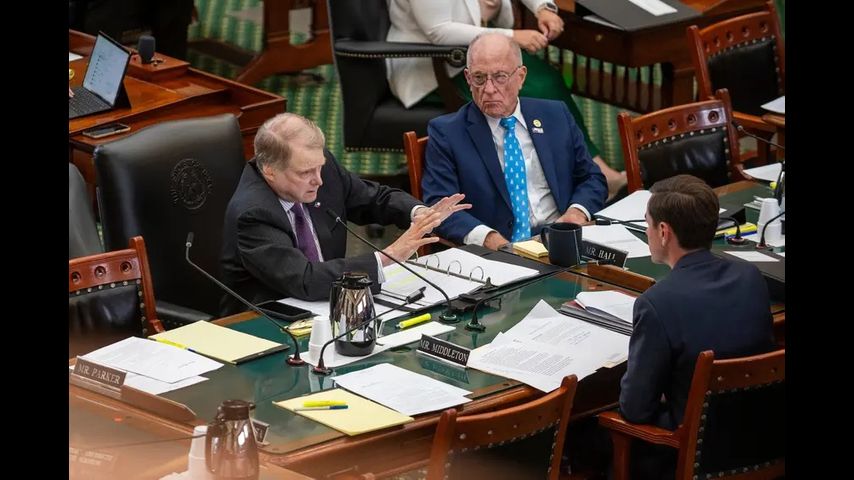Senate OKs latest bill restricting use of government and school bathrooms by transgender people
"Senate OKs latest bill restricting use of government and school bathrooms by transgender people" was first published by The Texas Tribune, a nonprofit, nonpartisan media organization that informs Texans — and engages with them — about public policy, politics, government and statewide issues.
Sign up for The Brief, The Texas Tribune’s daily newsletter that keeps readers up to speed on the most essential Texas news.
The Texas Senate on Wednesday again approved a “bathroom bill” proposal that would restrict transgender people from using bathrooms in government and school buildings that match their identifying gender.
Senate Bill 7 passed 18-2 in the upper chamber, as some Democrats were in Boston on Wednesday and not present on the floor. The bill would mandate that people only use restrooms in government buildings and schools that match their sex assigned at birth. Similar restrictions would also be placed on prisons and women’s violence shelters based on biological sex, which the bill also defines. SB 7 is one of two bills currently filed in the Texas Legislature after Gov. Greg Abbott put the provisions on the special session agenda.
Supporters of SB 7 and similar legislation have framed the bill as a way to protect women from discomfort and predation in private spaces. The bill’s author, Sen. Mayes Middleton, R-Galveston, said the bill was common sense that upheld “basic biblical truths.” To do this, Middleton said the bill has greater enforcement capabilities than previous bills: SB 7 institutes a $5,000 first-time fine for agencies or schools where violations occur, which increases to a $25,000 fine for subsequent violations.
A committee substitute that was filed Monday contained a provision mandating that the 15th Court of Appeals have exclusive jurisdiction to any civil action brought from the bill, and added its own definitions of male and female.
More than 400 people registered to testify in person or through writing on SB 7, most of whom were against the bill. Of those, more than 100 gave in-person testimony during a Senate State Affairs committee meeting Monday that at times became emotional over fears or recollections of harassment and abuse.
During that testimony, opponents of the bill said they feared that attempts to enforce the law would evolve into discriminatory scrutiny and surveillance affecting both cisgender and transgender women. The bill does not specify what agencies or schools would need to do to ensure the law is enforced, save that they “take every reasonable step to ensure” no violations occur. Middleton said on the Senate floor Wednesday that invasive searches or inspections of people entering bathrooms would not be considered a reasonable step.
“I won't just lose access to a restroom. I'll lose access to the future in the state I worked so hard to build,” said Autumn Lauener, vice president of the Texas Transgender Nondiscrimination Scholars, on Monday. “I'll be forced to use the men's restroom in workplaces that perceive me as a threat, risking harassment or worse.”
Those testifying against the bill also said it would cause undue suffering for trans people, and that legislators were wasting time that could be used for relief for victims of the Hill Country flooding.
Supporters of the bill maintained that it would protect women, and that they felt unsafe sharing restrooms or changing rooms with transgender people.
“Women and girls deserve to have privacy in their private spaces, and accommodating fewer than 1% of the population who believe they can alter their gender is not reason enough to put women and girls at risk,” True Texas Project President Fran Rhodes said.
Advocates for family violence shelters who testified also said they wanted language in the bill changed that lumped shelters in with spaces like restrooms because they worried it would de-incentivize victims from seeking help.
If passed into law, SB 7 will join a slew of other bills set to take effect in September that will also affect how trans people in the state will be able to live their lives. The greatest hurdle the bill will face is in the House, as the lower chamber has never passed a bathroom bill from the floor. While the House has a bill identical to SB 7 filed with a majority of the chamber signed on as coauthors, a similar display of support during the regular session still amounted to little movement.
Bathroom bills have historically faced significantly less obstacles in the Senate, where Lt. Gov Dan Patrick has voiced for years his support for similar proposals. Senate Bill 240, which was nearly identical to SB 7, passed through the upper chamber during the regular session before dying in the House.
If the bill does make it to the House floor, it still may still be left untouched, as most of the chamber’s Democrats fled the state on Sunday in a bid to break quorum and block Republican redistricting efforts. The move could stifle progress on any bills for the two weeks left in the special session.
The lineup for The Texas Tribune Festival continues to grow! Be there when all-star leaders, innovators and newsmakers take the stage in downtown Austin, Nov. 13–15. The newest additions include comedian, actor and writer John Mulaney; Dallas mayor Eric Johnson; U.S. Sen. Amy Klobuchar, D-Minnesota; New York Media Editor-at-Large Kara Swisher; and U.S. Rep. Veronica Escobar, D-El Paso. Get your tickets today!
TribFest 2025 is presented by JPMorganChase.
This article originally appeared in The Texas Tribune at https://www.texastribune.org/2025/08/04/texas-senate-transgender-bathroom-bill/.
The Texas Tribune is a member-supported, nonpartisan newsroom informing and engaging Texans on state politics and policy. Learn more at texastribune.org.





